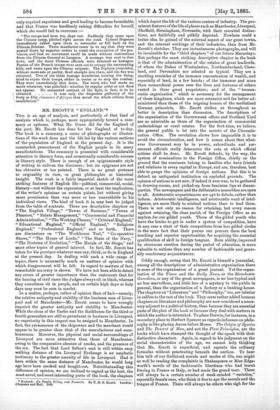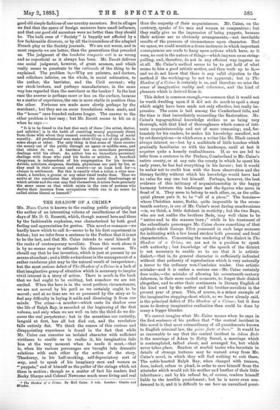MR. ESCOTT'S " ENGLAND."*
Tuts is an age of analysis, and particularly of that kind of analysis which is, perhaps, more appropriately termed a summary or epitome. What Mr. Green did for the England of the past, Mr. Escott has done for the England of to-day. The book is a summary, a series of photographs or illustrations of the work done and the life led by the various sections of the population of England at the present day. It is the counterfeit presentment of the English people in its many manifestations. The summary is presented with considerable attention to literary form, and occasionally considerable success in literary style. There is enough of an epigrammatic style -of writing to enliven the discourse ; but its epigrams are not too obtrusive or too pointed. There is no great pretence -to originality in view, or great philosophic or historical insight. The work is a fairly impartial sketch of the more striking features of English life—political, commercial, social, literary—not without the expression, or at least the implication, of the writer's opinions on certain points, but without giving more prominence than was more or less unavoidable to his individual views. The kind of book it is, may best be judged from the table of contents. There are descriptive chapters on 4‘ The English Village," "Towns of Business," "Towns of Pleasure," "Estate Management," "Commercial and Financial Administration," "The Working Classes," " Criminal England," 4' Educational England," "Official England," "Religious England," "Professional England," and so forth. There are discussions on "The Workhouse Test," "Co-operative Stores," "The House of Lords," "The State of the Navy," 4' The Doctrine of Evolution," "The Morals of the Stage," and most other topics of general interest. In fact, Mr. Escott has taken for his province whatever men say, think, or do in England at the present day. In dealing with such a wide range of -topics, there is necessarily much on matters of opinion with -which disagreement will be felt. In regard to matters of fact, remarkable accaracy is shown. We have not been able to detect any errors of greater importance than the statement that for -the hearing of civil cases the Judges always sit in black, whereas they sometimes sit in purple, and on certain high days or holy days may even be seen in scarlet.
In a matter, perhaps, rather of opinion than of fact—namely, the relative antiquity and stability of the business men of Liverpool and of Manchester—Mr. Escott seems to have wrongly imputed the greater antiquity and stability to Manchester. While the clans of the Earles and the Rathbones for the third or fourth generation are still so prominent in business in Liverpool, no superiority in this respect can be assigned to Manchester. In fact, the permanence of the shipowner and the merchant would appear to be greater than that of the manufacturer and warehouseman. Moreover, the physical and social surroundings of Liverpool are more attractive than those of Manchester, owing to the comparative absence of smoke, and the presence of the sea. The fact that Lord Sefton's seat is still within easy walking distance of the Liverpool Exchange is an emphatic testimony to the greater amenity of life in Liverpool. Had it been within the same distance of Manchester, he would long ago have been smoked and bought-out. Notwithstanding this difference of opinion, we are inclined to regard as the best, the most novel, and most interesting parts of the book, the chapters which depict the life of the various centres of industry. The prominent features of the life of places such as Manchester, Liverpool, Sheffield, Birmingham, Newcastle, with their essential distinctions, are faithfully and pithily depicted. Nowhere could a better idea be gained of the external aspect of our great towns, and the internal workings of their industries, than from Mr. Escott's sketches. They are instantaneous photographs, and will be invaluable for the "third chapters "of our future Macaulays. But perhaps the most striking descriptive chapter in the book is that of the administration of the estates of great landlords, of whom the Dukes of Westminster, Northumberland, Cleveland, and Devonshire are selected as typical. They are a startling reminder of the immense concentration of wealth, and especially of land, in a few hands ; of the .immense and more than monarchical power over the lives and fortunes of others vested in these great proprietors ; and of the "bureaucratic organisation" which is necessary for the management of these kingdoms, which are more extensive and far better administered than those of the reigning houses of the mediatised German princelets. Mr. Escott strikes us throughout as better in description than discussion. The descriptions of the organisation of the Government offices and Scotland Yard are as admirable as those of the organisation of commercial undertakings or rural estates. For the first time, we believe, the general public is let into the secrets of the Circumlocution Office. The revelation shows how impossible it is to avoid the circumlocution, and how it comes about that whatever Government may be in power, subordinate and permanent officials really determine the rate at which official actions shall be done. Mr. Escott defends, by the way, the system of nominations to the Foreign Office, chiefly on the ground that the nominees belong to families who have friends and relations in every capital in Europe, and are, therefore, best able to gauge the opinions of foreign nations. But this is to defend an antiquated institution on exploded grounds. The opinion of nations is not now, if indeed it ever was, to be gathered in drawing-rooms, and picked-up from feminine lips at dinnerparties. The newspapers and the deliberative assemblies are open to all. Aristocratic acquaintances are apt to delude, rather than inform. Aristocratic intelligence, and aristocratic want of intelligence, are more likely to mislead nations than to lead them. There is not only no reason for retaining, but every reason against retaining, the close parish of the Foreign Office as an asylum for our gilded youth. Those of the gilded youth who have the brains to get in under a system of competition, have in any case a start of their competitors from less gilded circles in the mere fact that their purses can procure them the best teaching and superior opportunities for acquiring the essential qualification of skill in foreign tongues. Born ability, improved by strenuous exertion during the period of education, is more valuable to nations than any number of fashionable and generally reactionary acquaintances.
Oddly enough, seeing that Mr. Escott is himself a journalist, among all the descriptions of administrative organisation there is none of the organisation of a great journal. Yet the organisation of the Times and the Daily News, or the Manchester Guardian, or any of the great newspapers, is no less typical and no less marvellous, and little less of a mystery to the public in general, than the organisation of a factory or a banking-house. The chapters on "Literature" and "Philosophy," too, are inferior in calibre to the rest of the book. They seem rather added because chapters on literature and philosophy are now considered a necessary adjunct to a political history, than because they are essential parts of the plan of the book or because they deal with matters in which the author is interested. To place Darwin, for instance, in a secondary place to Herbert Spencer as regards influence on philosophy is like placing Aaron before Moses. The Origin of Species and The Descent of Man, and not the First Principles, are the books which have stamped the thought of the epoch with their distinctive characters. Again, in regard to his judgment on the social characteristics of the age, we cannot help thithking that Mr. Escott is superficial, and repeats the ordinary formulas without penetrating beneath the surface. To hear him talk of our Gallicised morals and modes of life, one might as well be reading the complaints in Shakespeare or Miss Edgeworth's novels of the fashionable libertines who had learnt fencing in France or Italy, or had made the grand tour. There will always be a certain number of weak-minded "varieties," especially female ones, who think it fine to ape the morals and the tongue of France. There will always be others who sigh for the
good old simple fashions of our country ancestors. But in all ages we find that the apers of foreign manners have small influence, and that our good old ancestors were no better than they should be. The bulk even of " Society " is happily not affected by a few fashionable divorces, or by all the innuendoes of the adapted French play or the Society journals. We are not worse, and in most respects we are better, than the generations that preceded us. The judgment of the laudator temporis acti is as wrong and as superficial as it always has been. Mr. Escott delivers one social judgment, however, of great acumen, and which really seems to penetrate to the rationale of the thing to be explained. The problem is,—Why are painters, and doctors, and solicitors inferior, on the whole, in social estimation, to the author, the barrister, and the Civil servant; why are stock-brokers, and perhaps manufacturers, in the same way less regarded than the merchant or the banker ? In the last case the answer is perhaps more or less on the surface, because as a matter of experience, the one is more stable in position than the other. Fortunes are made more slowly perhaps by the merchant; but they are on surer foundations when made, and the " house " once founded endures longer. The answer to the other problem is less' easy ; but Mr. Escott seems to hit on it when he says :—
"It is to be found in the fact that each of them [the artist, doctor, and solicitor] is in the habit of receiving money payments direct from those with whom they consort nominally on a footing of social equality. All professional men make their living out of the public in some shape or other. The only thing is that some of them receive the money out of the public through an agent or middle-man, and -that others do not. A barrister has no immediate pecuniary dealings with' his client. An author has no immediate pecuniary dealings with those who read his books or articles. A beneficed clergyman is independent of his congregation for his income. Artists, solicitors, surgeons, dentists, physicians are paid by fee, or they send in their account and receive—or at least look for—a cheque in settlement. But this is exactly what a tailor, a wine merchant, a butcher, a grocer, or any other retail trader does. Thus we arrive at the conclusion that whatever the social disadvantage at which artists and the rest may find themselves, it arises from precisely the same cause as that which exists in the case of persons who derive their incomes from occupations which can in no sense be called either liberal or learned."



































 Previous page
Previous page